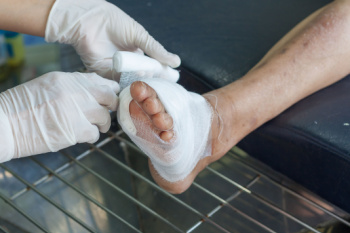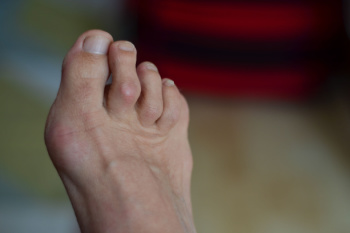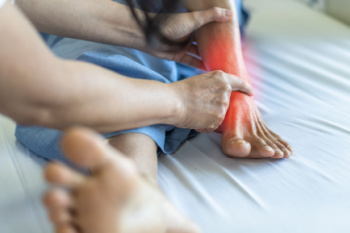Items filtered by date: April 2024
Understanding Common Causes of Foot Pain

Foot pain can affect individuals of all ages and lifestyles, impacting mobility and quality of life. One frequent reason for this type of pain is wearing improper footwear, such as shoes that are too tight, narrow, or lacking in support, leading to conditions like bunions, corns, and ingrown toenails. Overuse or repetitive strain on the feet, often seen in athletes or individuals with occupations that require prolonged standing or walking, can result in plantar fasciitis, stress fractures, and tendonitis. Additionally, structural abnormalities, such as flat feet, high arches, or misalignment of the bones, can contribute to chronic foot pain and discomfort. Systemic conditions like arthritis, diabetes, and circulatory disorders may also result in foot pain. Foot pain can be successfully treated by a podiatrist. If you have any type of foot pain, it is strongly suggested that you visit this type of doctor who can offer you appropriate treatment solutions.
Foot Pain
Foot pain can be extremely painful and debilitating. If you have a foot pain, consult with the foot specialists from Podiatry Associates of Belleville. Our doctors will assess your condition and provide you with quality foot and ankle treatment.
Causes
Foot pain is a very broad condition that could be caused by one or more ailments. The most common include:
- Bunions
- Hammertoes
- Plantar Fasciitis
- Bone Spurs
- Corns
- Tarsal Tunnel Syndrome
- Ingrown Toenails
- Arthritis (such as Gout, Rheumatoid, and Osteoarthritis)
- Flat Feet
- Injury (from stress fractures, broken toe, foot, ankle, Achilles tendon ruptures, and sprains)
- And more
Diagnosis
To figure out the cause of foot pain, podiatrists utilize several different methods. This can range from simple visual inspections and sensation tests to X-rays and MRI scans. Prior medical history, family medical history, and any recent physical traumatic events will all be taken into consideration for a proper diagnosis.
Treatment
Treatment depends upon the cause of the foot pain. Whether it is resting, staying off the foot, or having surgery; podiatrists have a number of treatment options available for foot pain.
If you have any questions, please feel free to contact our office located in Belleville, NJ . We offer the newest diagnostic and treatment technologies for all your foot care needs.
Important Facts to Know about Diabetic Feet

Diabetic feet represent a significant concern for individuals living with diabetes, as the condition can lead to various complications affecting foot health. One critical fact about diabetic feet is the increased risk of nerve damage, known as peripheral neuropathy, which can result in reduced sensation and difficulty detecting injuries or ulcers. Additionally, diabetes can impair blood circulation, leading to poor wound healing and an increased susceptibility to infections. Individuals with diabetes are also prone to developing foot ulcers, which, if left untreated, can escalate into serious complications such as gangrene and amputation. Proper foot care and regular inspections are essential for individuals with diabetes to prevent complications. This includes keeping the feet clean and moisturized, wearing comfortable and well-fitting shoes, inspecting the feet daily for cuts or sores, and seeking prompt medical attention for any signs of infection or injury. If you have diabetes, it is strongly suggested that you are under the care of a podiatrist who can help you manage this serious condition.
Diabetic foot care is important in preventing foot ailments such as ulcers. If you are suffering from diabetes or have any other concerns about your feet, contact the foot specialists from Podiatry Associates of Belleville. Our doctors can provide the care you need to keep you pain-free and on your feet.
Diabetic Foot Care
Diabetes affects millions of people every year. The condition can damage blood vessels in many parts of the body, especially the feet. Because of this, taking care of your feet is essential if you have diabetes, and having a podiatrist help monitor your foot health is highly recommended.
The Importance of Caring for Your Feet
- Routinely inspect your feet for bruises or sores.
- Wear socks that fit your feet comfortably.
- Wear comfortable shoes that provide adequate support.
Patients with diabetes should have their doctor monitor their blood levels, as blood sugar levels play such a huge role in diabetic care. Monitoring these levels on a regular basis is highly advised.
It is always best to inform your healthcare professional of any concerns you may have regarding your feet, especially for diabetic patients. Early treatment and routine foot examinations are keys to maintaining proper health, especially because severe complications can arise if proper treatment is not applied.
If you have any questions please feel free to contact our office located in Belleville, NJ . We offer the newest diagnostic and treatment technologies for all your foot and ankle needs.
What Are Causes of Hammertoe?

Hammertoe, a common foot deformity, can be attributed to various underlying factors, including rheumatoid arthritis, bunions, and corns. Rheumatoid arthritis, an autoimmune condition characterized by inflammation in the joints, can lead to the weakening of the muscles and ligaments in the toes, causing them to contract and deform over time. Similarly, bunions, bony protrusions that form at the base of the big toe, can exert pressure on adjacent toes, causing them to bend abnormally. Additionally, corns, thickened areas of skin caused by friction or pressure, can also contribute to hammertoe by forcing the toes into a bent position. Over time, these factors can result in the development of hammertoe, characterized by a permanent bend in one or more toes. Understanding the relationship between rheumatoid arthritis, bunions, corns, and hammertoe is important for implementing preventive measures and seeking appropriate treatment to alleviate symptoms and prevent further deformity. If you have developed this foot condition, it is suggested that you consult a podiatrist who can treat hammertoe.
Hammertoe
Hammertoes can be a painful condition to live with. For more information, contact the foot specialists from Podiatry Associates of Belleville. Our doctors will answer any of your foot- and ankle-related questions.
Hammertoe is a foot deformity that affects the joints of the second, third, fourth, or fifth toes of your feet. It is a painful foot condition in which these toes curl and arch up, which can often lead to pain when wearing footwear.
Symptoms
- Pain in the affected toes
- Development of corns or calluses due to friction
- Inflammation
- Redness
- Contracture of the toes
Causes
Genetics – People who are genetically predisposed to hammertoe are often more susceptible
Arthritis – Because arthritis affects the joints in your toes, further deformities stemming from arthritis can occur
Trauma – Direct trauma to the toes could potentially lead to hammertoe
Ill-fitting shoes – Undue pressure on the front of the toes from ill-fitting shoes can potentially lead to the development of hammertoe
Treatment
Orthotics – Custom made inserts can be used to help relieve pressure placed on the toes and therefore relieve some of the pain associated with it
Medications – Oral medications such as anti-inflammatories or NSAIDs could be used to treat the pain and inflammation hammertoes causes. Injections of corticosteroids are also sometimes used
Surgery – In more severe cases where the hammertoes have become more rigid, foot surgery is a potential option
If you have any questions please contact our office located in Belleville, NJ . We offer the newest diagnostic and treatment technologies for all your foot and ankle needs.
Diagnosis and Symptoms of Tarsal Tunnel Syndrome

Tarsal tunnel syndrome, or TTS, is a condition characterized by compression of the tibial nerve as it travels through the tarsal tunnel, located on the inner side of the ankle beneath the ankle bone. This compression leads to various symptoms affecting the foot and ankle. Diagnosis of TTS involves a thorough examination by a podiatrist, including a detailed medical history and physical assessment. Common symptoms of tarsal tunnel syndrome include tingling, burning, or shooting pain along the inner ankle and the sole of the foot. Some individuals may experience numbness or weakness in the affected area, which can worsen with prolonged standing or walking. As the condition progresses, symptoms may intensify, impacting daily activities and overall quality of life. If you have pain in this part of your foot, it is strongly suggested that you visit a podiatrist who can accurately diagnose and treat tarsal tunnel syndrome.
Tarsal tunnel syndrome can be very uncomfortable to live with. If you are experiencing tarsal tunnel syndrome, contact the foot specialists of Podiatry Associates of Belleville. Our doctors can provide the care you need to keep you pain-free and on your feet.
Tarsal Tunnel Syndrome
Tarsal tunnel syndrome, which can also be called tibial nerve dysfunction, is an uncommon condition of misfiring peripheral nerves in the foot. The tibial nerve is the peripheral nerve in the leg responsible for sensation and movement of the foot and calf muscles. In tarsal tunnel syndrome, the tibial nerve is damaged, causing problems with movement and feeling in the foot of the affected leg.
Common Cause of Tarsal Tunnel Syndrome
- Involves pressure or an injury, direct pressure on the tibial nerve for an extended period of time, sometimes caused by other body structures close by or near the knee.
- Diseases that damage nerves, including diabetes, may cause tarsal tunnel syndrome.
- At times, tarsal tunnel syndrome can appear without an obvious cause in some cases.
The Effects of Tarsal Tunnel Syndrome
- Different sensations, an afflicted person may experience pain, tingling, burning or other unusual sensations in the foot of the affected leg.
- The foot muscles, toes and ankle become weaker, and curling your toes or flexing your foot can become difficult.
- If condition worsens, infections and ulcers may develop on the foot that is experiencing the syndrome.
A physical exam of the leg can help identify the presence of tarsal tunnel syndrome. Medical tests, such as a nerve biopsy, are also used to diagnose the condition. Patients may receive physical therapy and prescriptive medication. In extreme cases, some may require surgery.
If you have any questions please feel free to contact our office located in Belleville, NJ . We offer the newest diagnostic and treatment technologies for all your foot and ankle needs.
Recovery From a Foot Stress Fracture

Recovery from a foot stress fracture requires patience, diligence, and strategic care to facilitate optimal healing and prevent further injury. Begin by prioritizing rest and minimizing weight-bearing activities to alleviate stress on the affected foot. Elevate the foot above heart level to reduce swelling and promote circulation, aiding in the healing process. As symptoms improve, gradually reintroduce gentle stretching and strengthening exercises to rebuild muscle strength and flexibility. Consider incorporating low-impact activities like swimming or cycling to maintain cardiovascular fitness while avoiding undue strain on the healing fracture. Ensure proper nutrition, including adequate calcium and vitamin D intake, to support bone health and expedite healing. If you have a stress fracture that has affected your foot, it is suggested that you schedule an appointment with a podiatrist who can help you properly manage this condition.
Activities where too much pressure is put on the feet can cause stress fractures. To learn more, contact the foot specialists from Podiatry Associates of Belleville. Our doctors can provide the care you need to keep your pain free and on your feet.
Dealing with Stress Fractures of the Foot and Ankle
Stress fractures occur in the foot and ankle when muscles in these areas weaken from too much or too little use. The feet and ankles then lose support when walking or running from the impact of the ground. Since there is no protection, the bones receive the full impact of each step. Stress on the feet can cause cracks to form in the bones, thus creating stress fractures.
What Are Stress Fractures?
Stress fractures occur frequently in individuals whose daily activities cause great impact on the feet and ankles. Stress factors are most common among:
- Runners
- People affected with Osteoporosis
- Tennis or basketball players
- Gymnasts
- High impact workouts
Symptoms
Pain from the fractures occur in the area of the fractures and can be constant or intermittent. It will often cause sharp or dull pain with swelling and tenderness. Engaging in any kind of activity which involves high impact will aggravate pain.
If you have any questions please feel free to contact our office located in Belleville, NJ . We offer the newest diagnostic and treatment technologies for all your foot and ankle needs.